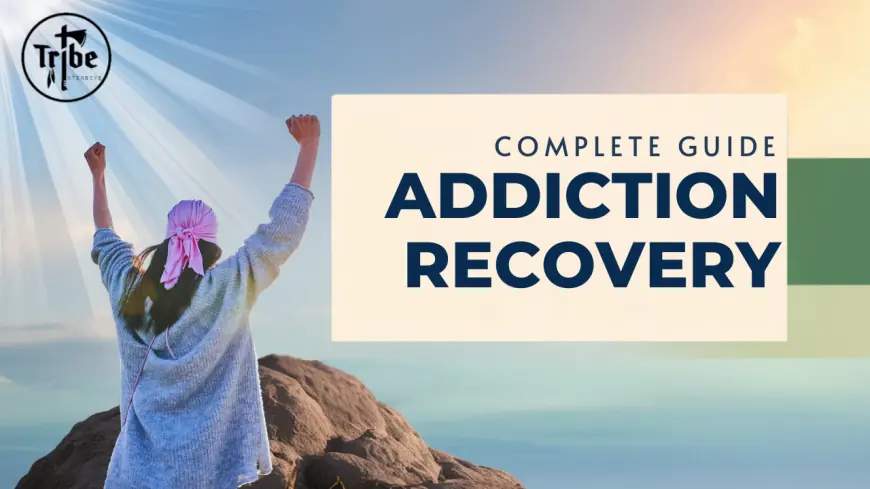Complete Guide to Addiction Treatment Programs for Recovery
Explore the complete guide to addiction treatment programs for recovery. This in-depth resource covers different types of treatment options, including detox, inpatient, outpatient, and aftercare programs. Learn how these therapies work together to help individuals overcome addiction and achieve lasting recovery. Whether you're seeking help for yourself or a loved one, this guide provides the information you need to take the first step toward a healthier future.

Addiction can feel like a relentless storm, sweeping away everything in its path for those caught in its grip. The journey to recovery may seem overwhelming and daunting. However, hope is not lost there are numerous pathways designed to support individuals on their road to healing. This guide delves into addiction treatment programs, offering insights into various approaches and therapies that pave the way for recovery.
Understanding addiction is crucial before embarking on this transformative journey. With so many options available, finding a program that aligns with individual needs and goals is essential. Whether seeking help for yourself or someone you care about, knowledge is power when navigating these challenging waters. Let’s explore the world of addiction treatment programs together and uncover the tools necessary for lasting change.
What is Addiction?
Addiction is a complex condition that affects the brain and behavior. It often involves compulsive substance use or engagement in certain activities despite harmful consequences. At its core, addiction rewires the brain’s pathways related to pleasure and reward. Substances like drugs, alcohol, or even behaviors such as gambling can create intense cravings that are hard to resist.
This overwhelming desire leads individuals to prioritize their addiction over everything else relationships, work, health. Such choices can spiral into a cycle of dependency that impacts daily life significantly. Understanding addiction means recognizing it not just as a physical issue but also as an emotional struggle. People may turn to substances or behaviors as coping mechanisms for underlying problems like trauma or anxiety. Acknowledging these layers is crucial for effective treatment and recovery strategies tailored to individual needs.
Understanding Addiction Treatment Programs
Addiction treatment programs are designed to help individuals overcome substance use disorders. These programs vary in intensity and structure, catering to diverse needs. Understanding the different components is crucial for making informed choices. Each program addresses unique aspects of addiction, focusing on physical, emotional, and behavioral recovery.
The journey often begins with assessment. Professionals evaluate the severity of addiction and any underlying issues that may impact treatment. This tailored approach increases the likelihood of successful outcomes. Support plays a significant role throughout this process. Clients benefit from counseling sessions, group therapy, and holistic practices aimed at fostering overall well-being.
Accessing these programs can empower individuals to reclaim their lives while navigating challenges along the way. By recognizing that no single path suits everyone, you can find a strategy that resonates personally.
Types of Addiction Treatment Programs
Addiction treatment programs vary widely to accommodate individual needs. Understanding these options can guide those seeking help.
Inpatient programs offer a structured environment. Patients stay at the facility 24/7, receiving intensive support and supervision. This is often ideal for severe addiction cases. Outpatient programs provide flexibility. Individuals attend therapy sessions while maintaining their daily responsibilities, such as work or school. This option suits those with milder addictions or strong support systems.
Residential treatment combines aspects of both inpatient and outpatient care. It typically involves living at the center but allows more independence during the recovery phases. Each type has its unique benefits and challenges. Choosing the right one relies on personal circumstances, the severity of addiction, and lifestyle factors that influence recovery success.
Inpatient Programs
Inpatient programs provide a structured environment for individuals battling addiction. Patients reside at a treatment facility, allowing them to focus entirely on recovery. These programs typically last 30 to 90 days, depending on individual needs and progress. During this time, participants receive round-the-clock care from medical professionals and therapists.
The immersive nature of inpatient treatment promotes healing away from everyday triggers and stressors. This supportive setting fosters community among peers who share similar struggles. Daily routines often include therapy sessions, group activities, and holistic treatments designed to address both physical and emotional aspects of addiction.
Patients benefit from personalized plans tailored to their unique circumstances. The goal is not just sobriety but also building essential coping skills for long-term success in recovery.
Outpatient Programs
Outpatient programs offer flexibility for those seeking addiction treatment while maintaining daily responsibilities. Participants attend therapy sessions and support groups without the need for overnight stays. These programs cater to individuals with varying levels of addiction severity. They typically involve scheduled sessions a few times a week, allowing clients to integrate their recovery into everyday life.
One key advantage is that participants can continue working or attending school. This structure helps reinforce coping skills in real-world situations.Additionally, outpatient programs foster community through group therapy, where individuals share experiences and encouragement. Building connections often becomes an essential part of the healing process.
The level of care varies; some may include intensive outpatient options for those needing more support. It's crucial to find a program tailored to individual needs and circumstances, ensuring a balanced approach to recovery on one's terms.
Residential Treatment Programs
Residential treatment programs offer a structured environment for individuals seeking recovery from addiction. Participants live on-site, providing an immersive experience that fosters healing. These programs typically last anywhere from 30 to 90 days. This duration allows residents to develop healthy routines and coping skills away from everyday stressors.
Residents engage in various therapeutic activities, including group therapy and individual counseling sessions. These interactions create a supportive community where individuals can share their experiences and learn from one another. Additionally, residential programs often include holistic treatments such as yoga or art therapy. Such approaches can enhance emotional well-being and promote self-discovery.
Living in a communal setting also helps build accountability among peers, encouraging everyone to stay committed to their recovery journey. It creates a safe space for personal growth while addressing the underlying issues of addiction effectively.
Therapies Used in Addiction Treatment
Therapies play a vital role in addiction treatment programs, addressing the psychological aspects of substance use. Each therapy targets different behaviors and thought patterns. Cognitive Behavioral Therapy focuses on identifying negative thoughts that lead to harmful actions. It helps individuals develop healthier coping strategies.
Dialectical Behavior Therapy emphasizes emotional regulation and interpersonal skills. This approach is particularly beneficial for those with co-occurring mental health issues. Contingency Management uses tangible rewards to reinforce positive behavior changes. It encourages individuals by rewarding milestones in their recovery journey.
These therapies create a supportive environment where patients can explore their feelings, confront challenges, and build resilience against relapse. The combination of these therapeutic approaches tailors treatment to individual needs, enhancing overall effectiveness in recovery efforts.
Cognitive Behavioral Therapy
Cognitive Behavioral Therapy is a powerful tool in addiction treatment. It focuses on the connection between thoughts, feelings, and behaviors. Through CBT, individuals learn to identify negative thought patterns that contribute to their substance use. This awareness allows them to challenge these thoughts and replace them with healthier alternatives.
Therapists guide clients in developing coping strategies. These skills help manage cravings and triggers more effectively. The structured nature of CBT makes it appealing to those seeking tangible results. Sessions typically involve practical exercises that reinforce learning outside the therapy room.
Moreover, evidence suggests that CBT can lead to lasting changes in behavior long after treatment ends. By fostering self-awareness and resilience, it empowers individuals on their recovery journey.
Dialectical Behavior Therapy
Dialectical Behavior Therapy is a specialized form of cognitive-behavioral therapy. It was originally developed to treat borderline personality disorder but has since been effective for various addictions. At its core, DBT blends acceptance and change strategies. This dual approach helps individuals validate their feelings while also encouraging them to challenge harmful behaviors.
Skills training in mindfulness, emotional regulation, distress tolerance, and interpersonal effectiveness are key components. These skills empower clients to manage overwhelming emotions without resorting to substances. DBT sessions often involve individual therapy combined with group skills training. This format fosters connection and community among participants as they navigate their recovery journeys together.
Therapists play an essential role by offering support while pushing clients toward personal growth. For many facing addiction, DBT provides the tools needed to create a balanced life free from substance dependence.
Contingency Management
Contingency Management (CM) is a behavioral therapy that uses rewards to encourage positive behaviors. It operates on the principle of reinforcing desirable actions, such as abstaining from drugs or attending therapy sessions. In CM, patients earn tangible rewards for meeting specific goals. These can range from gift cards to privileges within the treatment program. The goal is simple: motivate individuals to stay engaged in their recovery journey.
This approach has shown promise in treating various addictions, including substance use disorders. By providing immediate incentives, CM enhances motivation and promotes accountability among participants. The structure of these programs allows individuals to see the direct impact of their efforts. This sense of accomplishment can significantly boost self-esteem and drive further progress in recovery efforts.
Medications for Addiction Treatment
Medications play a crucial role in many addiction treatment programs. They can help manage withdrawal symptoms and reduce cravings.
Common medications include methadone, buprenorphine, and naltrexone. These are often used for opioid dependence. Each medication works differently to assist individuals during their recovery journey.
For alcohol use disorders, acamprosate and disulfiram can be effective options. Acamprosate helps stabilize brain chemistry after quitting drinking, while disulfiram discourages alcohol consumption by causing unpleasant reactions when alcohol is ingested. It’s essential to work closely with healthcare professionals when considering medication-assisted treatment. Personalized care ensures the selected approach aligns with individual needs and circumstances.
While medications can significantly support recovery, they are most effective when combined with counseling or therapy. This holistic approach addresses both physical dependencies and underlying psychological issues that contribute to addiction.
Dual Diagnosis Treatment
Dual Diagnosis Treatment addresses the complexities of individuals facing both addiction and mental health disorders. This integrated approach recognizes that these issues often coexist, complicating recovery. Patients receive comprehensive care tailored to their unique needs. Therapists and psychiatrists collaborate closely, ensuring a cohesive treatment plan. This synergy fosters an environment where individuals can explore the roots of their struggles without stigma.
Therapeutic techniques vary widely, ranging from cognitive behavioral therapy to mindfulness practices. These methods help patients develop coping strategies while addressing underlying psychological conditions. Medication may also play a crucial role in stabilizing mood or reducing cravings. By treating both aspects simultaneously, dual diagnosis programs enhance the chances for sustainable recovery.
Supportive environments are essential in this journey. Patients often find solace in group therapies where shared experiences pave the way for healing connections.
Support Groups in Recovery
Support groups play a crucial role in the recovery journey for those battling addiction. These gatherings provide a safe space for individuals to share their experiences, struggles, and victories. The sense of camaraderie can be incredibly uplifting.
Participants often find comfort in knowing they are not alone. Hearing stories from others who have faced similar challenges fosters connection and understanding. This shared experience encourages openness and honesty, which are vital for healing.
Many support groups follow structured formats, including regular meetings that focus on discussion or specific topics related to recovery. Members also engage in accountability practices that help keep them focused on their goals.
The emotional support offered by these groups is invaluable. Friends made during this time can become lifelong allies in sobriety, navigating the ups and downs of life together while maintaining a commitment to recovery efforts.
12-Step Programs
12-step Programs have become a cornerstone in addiction recovery. These structured programs provide a clear path for individuals seeking to overcome their substance use disorders.
At the heart of these programs is the idea of community and shared experiences. Participants connect with others who understand their struggles, fostering accountability and support. This connection can be vital for long-term sobriety.
Each step encourages personal reflection and growth, tackling issues like denial, surrendering to a higher power, and making amends. Members work through these steps at their own pace but often find strength in community rituals.
The flexibility of 12-step groups means they're widely accessible. They’re available across various locations, often without any cost involved. Many people find that regular attendance nurtures resilience against relapse while reinforcing commitment to recovery goals.
Choosing the Right Treatment Program
Choosing the right treatment program is a critical step in your recovery journey. It can feel overwhelming with so many options available. Start by assessing your individual needs and preferences. Consider factors like the severity of addiction, any co-occurring mental health issues, and your circumstances.
Research different types of programs to find one that aligns with your lifestyle. Some may prioritize flexibility, while others require full immersion. Talk to professionals who can guide you through this decision-making process. They often have insights into what works best for specific situations.
Don’t forget about aftercare options as well. Continuing support plays a significant role in long-term recovery success. Make sure to involve family or trusted friends; their perspectives might provide clarity during this emotional time. Choosing wisely lays the groundwork for lasting change and healing ahead.
Benefits of Addiction Treatment Programs
Addiction treatment programs offer a pathway to recovery and improved well-being. They provide individuals with the tools needed to overcome substance abuse. Many programs focus on personalized care, tailoring treatments to meet unique needs. This individualized approach increases the chances of long-term success.
Participants often benefit from professional support. Qualified staff guide them through difficult moments, ensuring they feel less isolated in their journey. Moreover, these programs foster community connections. Sharing experiences with others facing similar challenges can create lasting bonds and encourage accountability.
Accessing various therapeutic techniques is another advantage. From cognitive behavioral therapy to medication-assisted options, participants have a wide range of choices that can enhance their recovery experience. Treatment programs instill life skills that are essential for maintaining sobriety after completion. Learning coping mechanisms prepares individuals for life’s ups and downs without reverting to old habits.
Challenges of Addiction Recovery
Addiction recovery is often a winding road filled with obstacles. One of the primary challenges is dealing with cravings. These intense urges can resurface unexpectedly, making it tough to stay on track. Emotional turmoil also plays a significant role in recovery. Individuals may grapple with guilt, shame, or anxiety related to their past behaviors. This emotional baggage can hinder progress and create setbacks.
Social influences add another layer of difficulty. Friends or environments that trigger cravings might lead individuals back into old habits. Building a new support network becomes essential but can take time.
Moreover, maintaining motivation during long-term recovery is crucial yet challenging. The initial excitement fades, and daily struggles can weigh heavily on individuals trying to stay committed to their journey. Relapse rates are high as well, which adds pressure and fear for those striving for sobriety. Facing these realities requires resilience and unwavering dedication.
Conclusion
Navigating the world of addiction treatment programs can feel overwhelming. However, understanding the various options available is crucial for anyone seeking recovery. These programs are designed to address not just the physical aspects of addiction but also the emotional and psychological components that accompany it.
Each type of program from inpatient to outpatient offers unique benefits tailored to individual needs. The therapies involved, such as Cognitive Behavioral Therapy or Dialectical Behavior Therapy, play a significant role in fostering long-term recovery. Similarly, support groups like 12-step Programs provide invaluable community connections that reinforce sobriety.
Choosing the right treatment program requires careful consideration and introspection. It's essential to weigh personal circumstances against what each program offers for effective healing.
While challenges remain in every recovery journey, knowing you have resources and support can make all the difference. Addiction treatment programs offer hope, guidance, and pathways toward living a fulfilling life free from substance dependence. By taking that first step towards getting help, individuals open themselves up to a brighter future filled with possibilities for health and happiness.
What's Your Reaction?
 Like
0
Like
0
 Dislike
0
Dislike
0
 Love
0
Love
0
 Funny
0
Funny
0
 Angry
0
Angry
0
 Sad
0
Sad
0
 Wow
0
Wow
0





















































